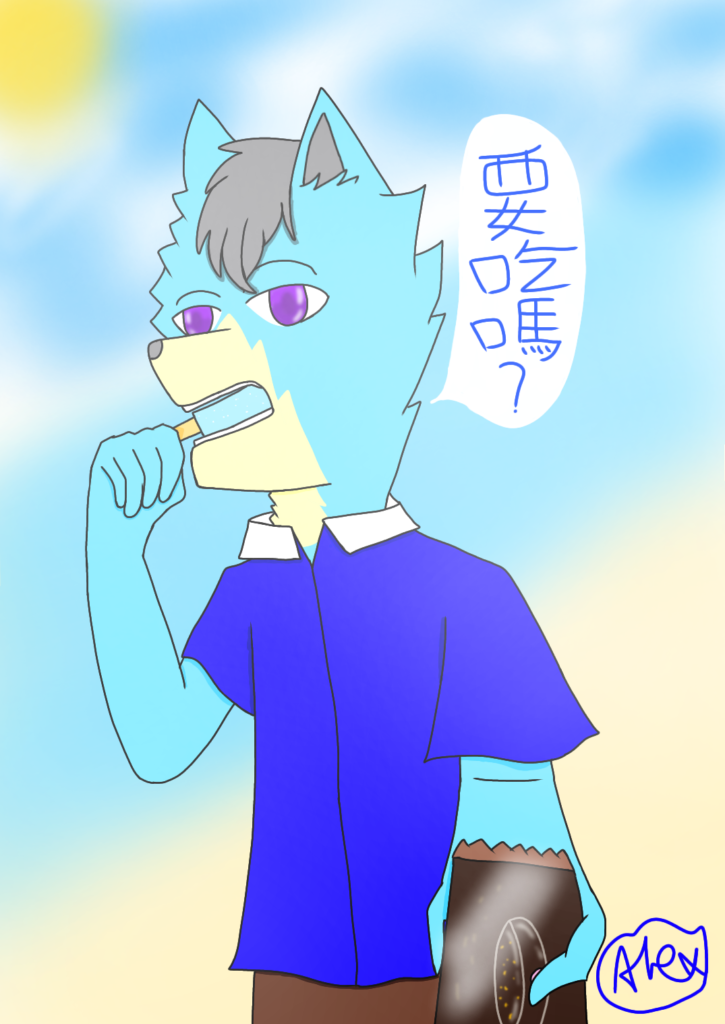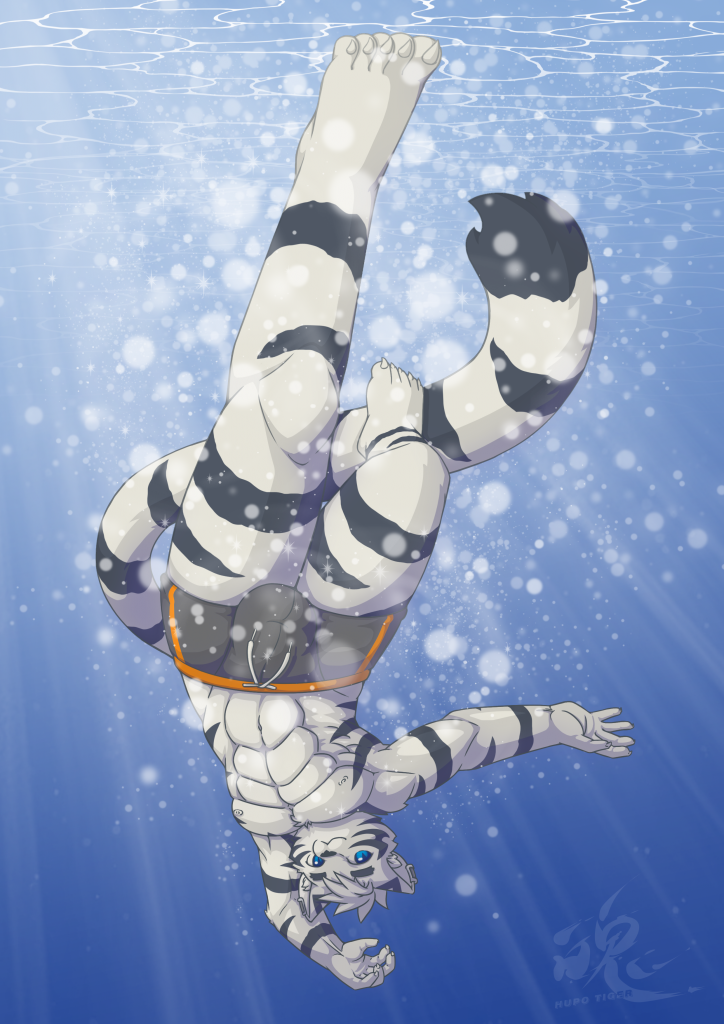Feed aggregator
Interview With Gozi
>> Resources, Social Media, & Donation Links <<
Follow Gozi
Gozi is a golden tiger fairly new to the furry platform, but has already made a name for himself. After calling out bad actors in the community on Twitter he typically tries to do his part in spreading the word on small time creators using the platform he's built for himself, knowing how hard it really is.
Honestly he's someone I've started to personally look to when everyone else seems crazy. Though, I guess everyone's got a little crazy in them, right?
This episode in particular notes a bit of a format change as we pivot into interviews focused on small content creators while retaining that tangy, zesty, dose of reality.
Finally Cracking
After bouncing around and looking for distribution for literally years, we finally have a release date for the new CGI animated feature Animal Crackers, directed by Scott Christian Sava and animation veteran Tony Bancroft (Mulan). The film is being released this Friday, July 24th on Netflix (of course!). Animation Scoop has an extensive interview with the directors about their efforts to get the film made, and out to the world. We’ll say this at least: The new trailer looks better than what we’ve seen before. See what you think this Friday.
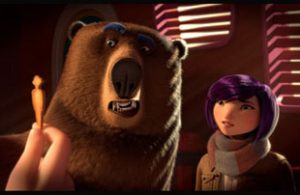
image c. 2020 Netflix
COVID-19 and Furries – 4 furcons cancelled this week; online events continue to grow in response

In the past week, 4 furcons mainly from the Americas continent are cancelled; Red Deer Mini Con (Canada), Midwest FurFest (Illinois USA), Aquatifur (Wisconsin USA) and Confuror (Mexico). So far, Mexico’s Confuror has officially announced that they are going to become fully virtual for free this year, on 9 – 11 October, their originally planned […]
夏日祭典——B. Cat
七月轉眼間已經過了三分之二了,但夏日祭典可是不會這麼快結束的!
這次皓然要為各位帶來的,是由B. Cat所繪製的作品!夜晚中的夏日祭典,在B. Cat的筆下顯得更為熱鬧。就讓皓然帶著大家一起來欣賞B. Cat的作品吧!
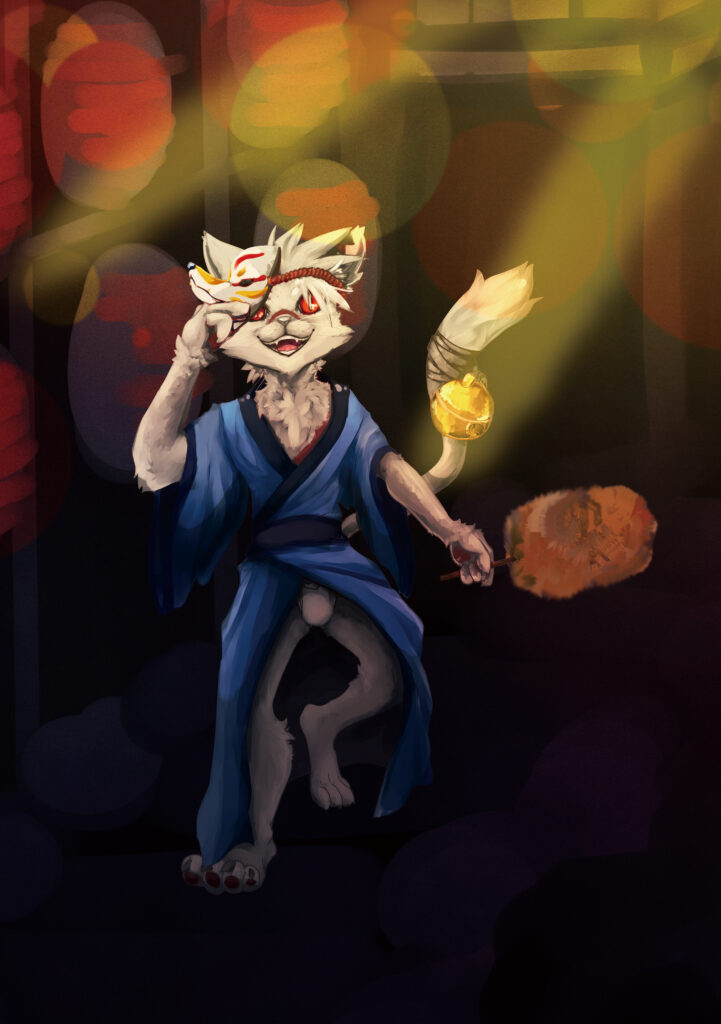
作者:B. Cat
Episode 469 - Awoo Fest - This week: Furry con Armageddon, the military on Twitch, and Twitter got seriously compromised.Patreon, its pretty ok: https://www.patreon.com/Southpawscast
This week: Furry con Armageddon, the military on Twitch, and Twitter got seriously compromised. Patreon, its pretty ok: https://www.patreon.com/Southpawscast
Episode 469 - Awoo Fest - This week: Furry con Armageddon, the military on Twitch, and Twitter got seriously compromised.Patreon, its pretty ok: https://www.patreon.com/SouthpawscastMommy’s Not Amuzed
Xira is a new full-color science fiction comic series written by Mauro Mantella, with art by Diego Giribaldi. Check it out over at Bleeding Cool: “Xira has been experimented on her entire life to help mankind create the perfect astronaut, making her smarter, faster, stronger. When Xira is allowed to have a baby who will also be experimented on Xira has had enough and will do whatever it takes to get herself and her child to freedom.” The first issue should be comic to comic book stores soon from Red 5 Comics.
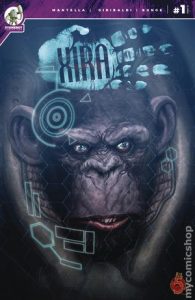
image c. 2020 Red 5 Comics
[Live] Weak Choice

It’s been 10 years of FurCast! Thank you all for making it possible. How about another 10? Maybe by then cons will stop being canceled!
FurCast is sponsored by Twin Tail Creations. Use coupon codes REDWOLF or BLUEFOX to save 15% on silicone products during checkout. Free FurCast Themed Colorations are also available which can be applied as a color choice to your toy purchase.
Link Roundup:- MFF 2020 Canceled
- Confuror 2020 Canceled
- New Years Furry Ball 2020 Canceled
- Further Confusion 2021 Canceled
- JMoF 2021 Canceled
- Fur Squared 2021 Canceled
- VirtualFurence doing a VRChat dance comp
- Firr continues to be out of control, modeling the MFF hotel
- Tweet thread to SwiftOnSecurity about the firefox fursuit
- Proton VPN responds to Swift by dressing up in dolphin suits
- Netflix’s Twitter is basically furry
- Beastars coming back in 2021
- Redskins team being renamed to Red Wolves
- SirusXM is buying Stitcher for $325 million
- Flayrah article on socialist teeth
- Grant Imahara passes away
- SciShow: No your dog doesn’t think you’re the alpha
- Canada & US agree to keep border closed another month
- FCC approves 998 as new suicide hotline number
- London Foxes show early signs of self-domestication
- Man Unearths Witch Bottle
- Mysterious Covid On Ship
- London Foxes show early signs of self-domestication
- ImprovChat Bot
Bearly Furcasting #12 - Khord Kitty, Magic Math and Bad Jokes
MOOBARKFLUFF! Click here to send us a comment or message about the show!
This week we talk with Khord Kitty and read a letter from Taebyn's Tail. We do a little magic math and hear a few bad jokes. And what exactly is a Folf? Spend some time with Bearly and Taebyn and let's have a great time!
Thanks to all our listeners and to our staff: Bearly Normal, Rayne Raccoon, Taebyn, Cheetaro, TickTock, and Ziggy the Meme Weasel.
You can send us a message on Telegram at BFFT Chat, or via email at: bearlyfurcasting@gmail.com
Where Should Artists Post Their Art? Everywhere!
As a furry artist, I’m currently taking commissions and I submitted a price list in a furry discord server, how long should I wait until I get a commission offer? Should I also post in other social media’s instead to gather the attention of others? Thanks.
~Silver
* * *
Dear Silver,
As an artist looking for commission work, you should post your availability on every furry (and nonfurry) site possible, not just Discord. You should be posting on FurBuy, Inkbunny, FurAffinity, SoFurry, Furry4Life, Furrific, FurrTrax, DeviantArt, Weasyl, VCL, Furry Amino, Twitter, Facebook, Instagram, Etsy, Tumblr, and anything else you can find.
I, personally, feel that all artists should also maintain a website so that they can direct people to a site where you can display and sell your art to the best effect. Make your art omnipresent so that you get noticed. Some of these sites allow you to sell your art while others just allow you to display it; either way, direct them to your website. Make sure you have samples of your art available for people to check out.
How long should you wait for a commission? Until what, you give up? If you give up, you will never sell your art. So, wait for as long as it takes.
Hugs,
Papabear
獸無限ONLINE推出!線上獸無限首次登場
日前原訂於10/30~11/1舉行,卻因疫情宣告取消的「獸無限Infurnity」,在今日(7/18)宣佈推出本年份的特殊活動線上獸聚「獸無限Online」,主打不論身在何方,只要有網路便可參加!
「獸無限Infurnity」(下稱獸無限)是台灣知名的獸迷聚會之一,每年舉辦皆吸引國內外眾多毛毛及獸迷們共襄盛舉。歷年的獸無限皆會有特定主題,如今年度的主題「戲獸台灣」,繪師藍道夫,鑰鑰,肯尼,斷翼等皆繪製了相關慶祝圖。
但今年由於新冠肺炎的影響,基於獸迷的健康因素考量,大型獸展紛紛宣告取消延期,其中便包括獸無限,令廣大獸迷們捶胸頓足。
然而疫情並不能澆熄眾「獸」的熱情,網路使得距離不再成為阻力,先前即有國外的VirtualFirence等獸聚為大家開例,此次獸無限Online也透過網路形式,以新型態之姿在保障參與者健康安全的情況下,匯聚獸迷的熱情。
獸無限Online將於10/31舉辦,至於相關內容形式,獸無限團隊在貼文中表示各類線上企劃正在募集,也歡迎大家查看新的活動網頁得到最新資訊。
獸無限Online網站:https://online.infurnity.com/
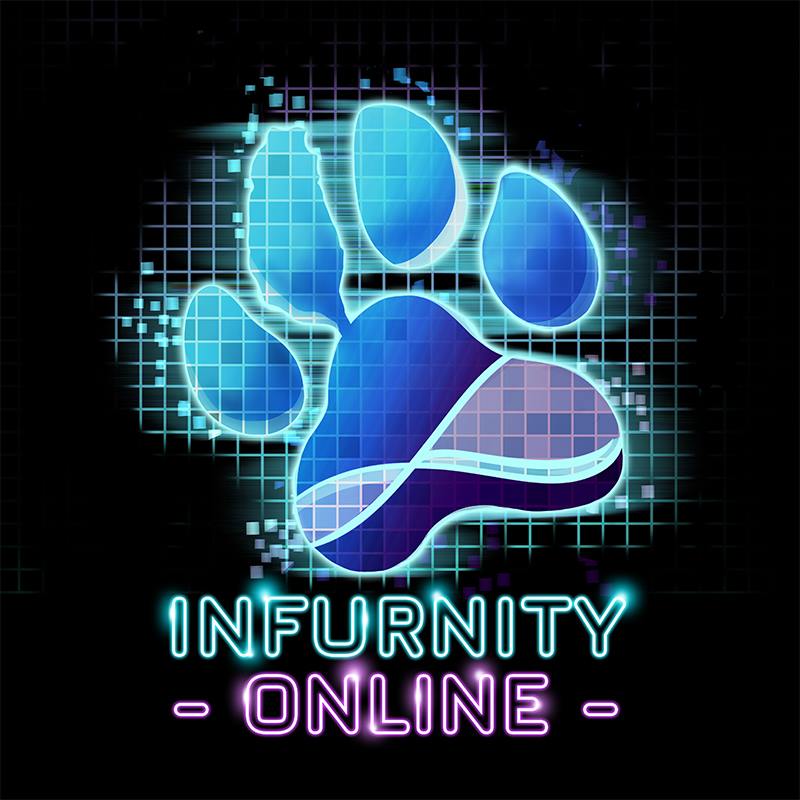
Tiger’s On His Way
Just over a year ago we mentioned that Laurence Yep’s popular fantasy novel The Tiger’s Apprentice would be on its way to movie screens in 2022. Well now thanks to AWN we have an update: “Time to brush up on your Chinese Zodiac! Hunky Henry Golding (Crazy Rich Asians, Last Christmas) is set to lend his vocal talents to his first ever voice acting gig as the shape-shifting tiger, Mr. Hu, in Paramount Animation’s feature film adaptation of Laurence Yep’s 2003 best-selling children’s book, The Tiger’s Apprentice. The film marks the feature directing debut for Carlos Baena, a former Pixar animator known for his work on Wall-E and Toy Story 3, as well as his award winning 2019 animated short, La Noria… The Tiger’s Apprentice, book one in a trilogy of the same name, follows Tom, a young boy living in San Francisco. The real world and one of magic collide when Tom meets Mr. Hu, a talking tiger who mentors the child in the art of mystical protection against evil.” No word yet on any changes to the date, so hopefully we can still look forward to it on February 11th, year after next.
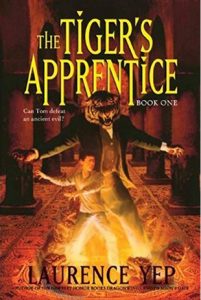
image c. 2020 HarperCollins
Samurai Rabbit in Space?
In the about-damn-time department, word is spreading fast that Stan Sakai’s iconic furry comic Usagi Yojimbo is being adapted into a new animated TV series for Netflix of all places… but, with a twist. Here’s how Comics Beat put it: “Variety reports that Netflix and Gaumont Animation are teaming to create a CGI animated series based on the character. The series will be executive produced by Sakai, titled Samurai Rabbit: The Usagi Chronicles, along with a handful of others including Mike Richardson of Dark Horse Entertainment and James Wan. According to Variety, the series won’t be a straight adaptation of Sakai’s Usagi Yojimbo series, but will use the comics as lore for a series set in the far future. The story will follow Rabbit Samurai Yuichi, a descendant of Miyamoto Usagi, and ‘a ragtag team of misfit heroes’ who accompany him on his quest to live up to his ancestor’s legacy.” Stay tooned for more news about a release date.
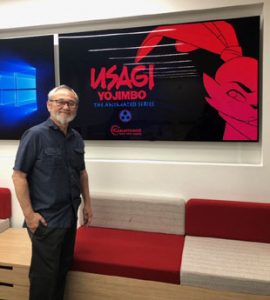
image c. 2020 by Stan Sakai
夏日祭典——艾莉克斯《夏天就是要吃冰》
大家好!皓然今天又要為各位帶來繪師們的作品啦!這次要為各位帶來的,是由艾莉克斯所繪製的《夏天就是要吃冰》。
在炎炎夏日中,來上一根冰涼的冰棒,總是獸生中的一大享受。讓我們跟著艾莉克斯一起,在這熾熱的夏天中享用沁涼的冰棒吧!
作者:艾莉克斯
作品名稱:夏天就是要吃冰
Free from the Zoo to You
If you haven’t heard yet: Free Comic Book Day is on this year — but in a different way. Now it’s Free Comic Book Summer, where the samplers will be passed out in batches over several weeks, rather than all at once, as a way to prevent crowding at comic book stores. And here’s one we found right off the bat… Brett Bean is an illustrator and character designer who is a “frequent face” at comic book convention artist alleys. Well now he’s come out with his own series of full-color graphic novels called Zoo Patrol Squad. “The lion has gone missing? The king cobra has vanished? Sounds like a job for the Zoo Patrol Squad! Timid Fennlock Fox and outgoing Penny the Pig team up for their first adventure as they look for clues to track down the missing animals in their usually peaceful zoo.” The free Zoo Patrol Squad sampler is available now at a comic shop near you (wear a mask and visit safely!) and the first graphic novel in the series, Kingdom Caper, is available for order on line. Oh, and visit Brett’s web site to see more of what he’s worked on too.
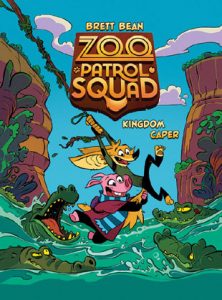
image c. 2020 Penguin Workshop
Stilton Goes Strange
It’s the internationally famous mouse investigator Geronimo Stilton — like you’ve never seen him before, thanks to Tom Angleberger and The Sewer Rat Stink. From the Cheshire Public Library review: “Angleberger, best known for his Origami Yoda series, adapts the escapades about the renowned rat reporter into a graphic novel. A horrible stench has invaded New Mouse City, and citizens are leaving in droves. So Geronimo and his old pal private detective Hercule Poirat venture into the smelly sewers of Mouse Island, where they discover a secret society of rats plotting to take over the world.” With an original story by Elisabetta Dami, The Sewer Rat Stink is available now in hardcover.
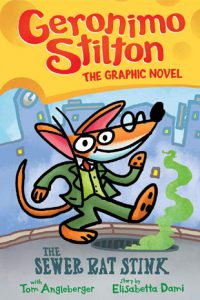
image c. 2020 Scholastic, Inc.
TigerTails Radio Season 12 Episode 31
Bringing Out The Beast In Sports
You knew we were gonna use that reference for this, right? Here’s what we found at Animation World Network: “Xilam Animation has reached distribution deals with Nickelodeon for the CGI animated series Athleticus… Targeting family audiences, Athleticus is produced by Xilam’s recently acquired CGI-studio Cube Creative and features wild animals taking part in competitive sports, ranging from table tennis to high bar, bobsleigh to curling. How successful the animals are at each of the sports entirely depends on their personality and anatomies resulting in very comical, and often poetic, results. The series is created and directed by the award-winning Nicolas Deveaux.” While the distribution deal does not include much of North America (typical!), many of the Athleticus shorts have made their way to YouTube, and there’s a sampler commercial there as well.
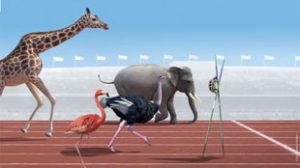
image c. 2020 Xilam Animation
2022年美国马里兰州将举办新的由有色人群(BIPOC)主导的兽展:Harvest Moon Howl Fest

English article 鉴于最近发生的喬治・佛洛伊德被警察谋杀的事件,许多的积极分子运动试图提高人们对当今社会仍在发生的种族不公正现象的认识。种族不平等的问题再一次被这些事件所揭露,直到有色人种在我们的社区中感到安全,许多人认为我们还有很长的路要走。 无论是科幻圈或毛兽圈,这些粉都一向来并不总是那么多样化的。随着这些粉都的发展,以前被忽视的成员逐渐得到互相意识并希望被看到。现在,来自马里兰州的一群毛兽们正打算自己动手,主要在BIPOC(黑人、土著和有色人种)社区的帮助下举办一个大展。 Harvest Moon Howl Fest将在马里兰州一个200英亩的营地举行,是全球众多兽展中最新的一个。然而,与大众不同的是,Harvest Moon Howl Fest的主要目标是由BIPOC和其他边缘群体的人们在原有基础上建立一个兽展。董事会主要将由来自黑人社区的毛兽们管理,但该兽展的首席执行官向那些有顾虑的人们保证,来自所有任何背景的毛兽们都可以自由参加、志愿服务或申请当其工作人员。 该兽展将邀请参与者到用于大型节日的私人场地上露营,并会举办各种活动,这些活动包括兽装舞、团队游戏及现场音乐。这想法是在首席执行官Chise在一次慈善直播中在4个小时内帮助BIPOC社区筹集了9000多美元后实现的。 “这想法在过去被提出当建议,之后看到我们最近直播成功之后,我们认为,如果BIPOC社区能够在四个小时内聚集在一起,并一起筹到如此这么大的数字,想象一下我们在兽展上能做出什么。更何况一直以来都在努力争取一个由BIPOC主导的兽展董事会会帮助满足一个多元化兽圈的需求和愿望。” ——HMFF首席执行官Chise 她还觉得,似乎来自社区的围绕这些问题的担忧被忽视了。”我认为BIPOC社区中那些人的许多担忧都没有被听到。无论是关于他们对那些可能参展的仇恨团体,还是某些展会的董事会中缺乏代表而感到不适,这个展会都会试图将这些负面的感觉给消除。” 之后在推特,有一小部分的用户,为了激起人们的不认同感,他们对其展表达了担忧,甚至给《丰收之月》电子游戏系列的开发者Natsume打上了标签。该公司然后对其兽展表达了支持,但有评论者抱怨说他“对看到Natsume支持种族隔离而感到悲哀”。很快的,该展的董事会打消了这些关于他们“将参与者限于BIPOC”的误解。 Chise表示,他们致力于阻止这些谎言的传播。”你是直接从马的嘴里(英语习语“straight from the horse’s mouth”,指从本源或最信赖的来源得到信息)听到的。我们绝对是不分种族而向所有人开放的兽展。所有信息,除了来自我本人或我的董事会,都不是真的。” 制定该展的初步计划花了大约一周的时间。“我是那种当我有想法和愿景时而不会停止的人。”Chise说道。 看到该展第一次发布的公告有超过6000个回复,你可期待在2022年秋季在美国马里兰州光明崛起的首届Harvest Moon Howl Fest兽展。 该报道的本源是 Dogpatch Press. **编者注:自2020年7月16日新加坡时早晨1:05起,以尊重Midwest FurFest的知识产权政策和利益,Harvest Moon FurFest已被更名为Harvest Moon Howl Fest。
